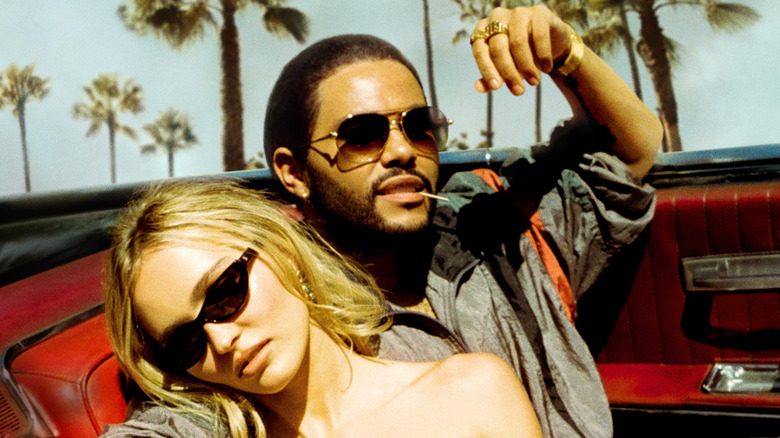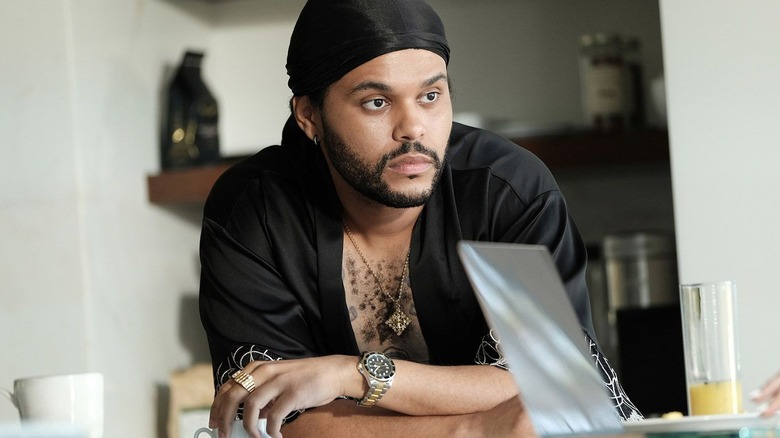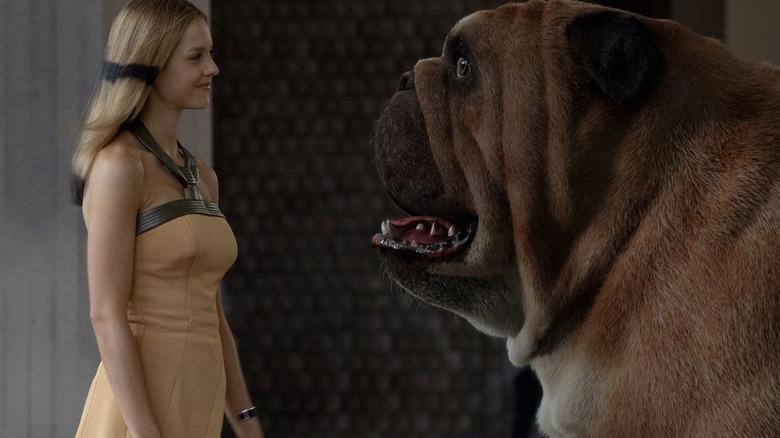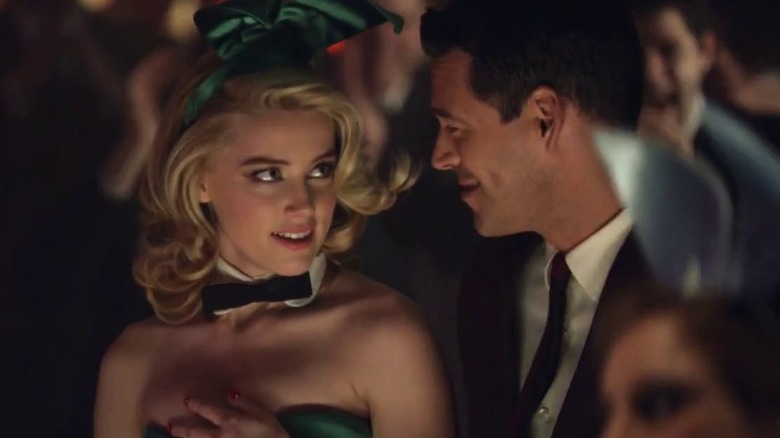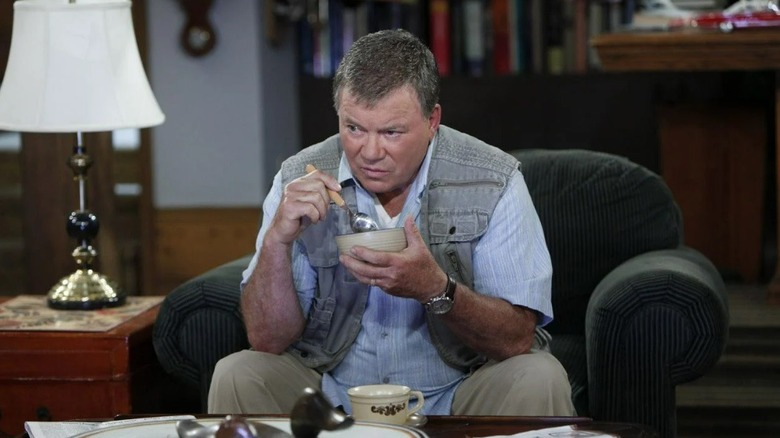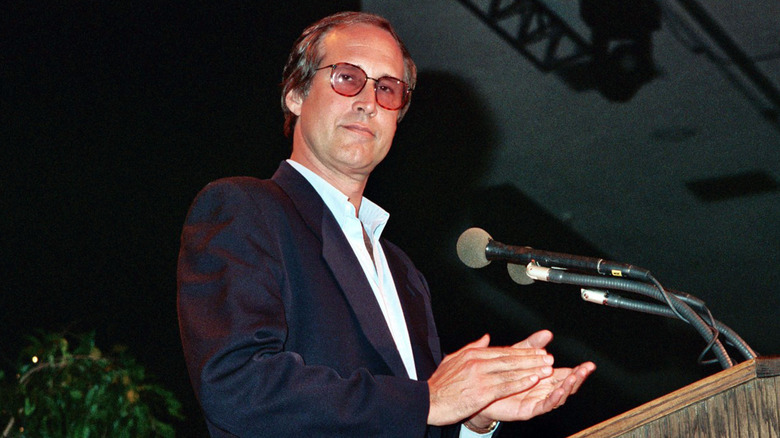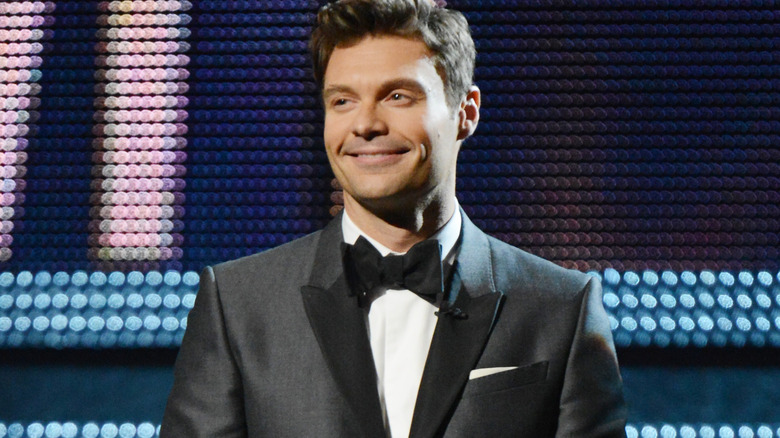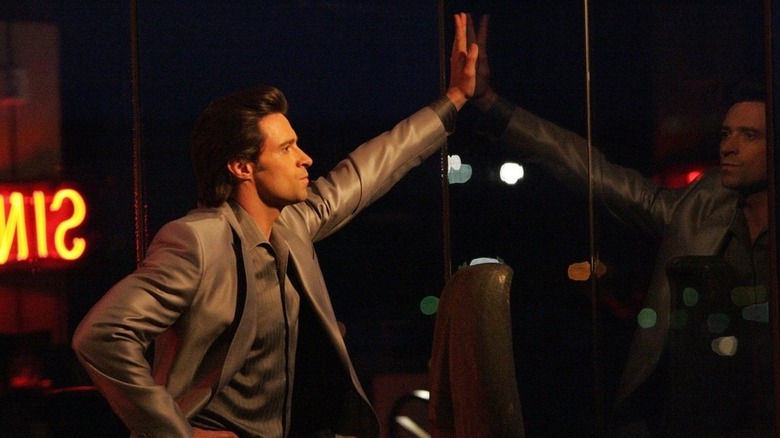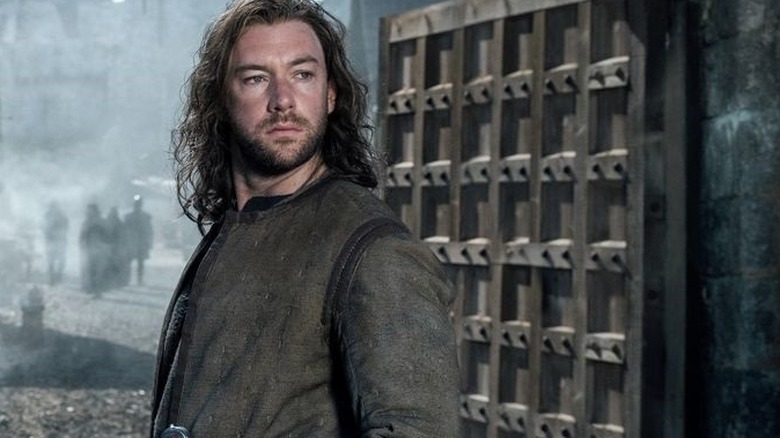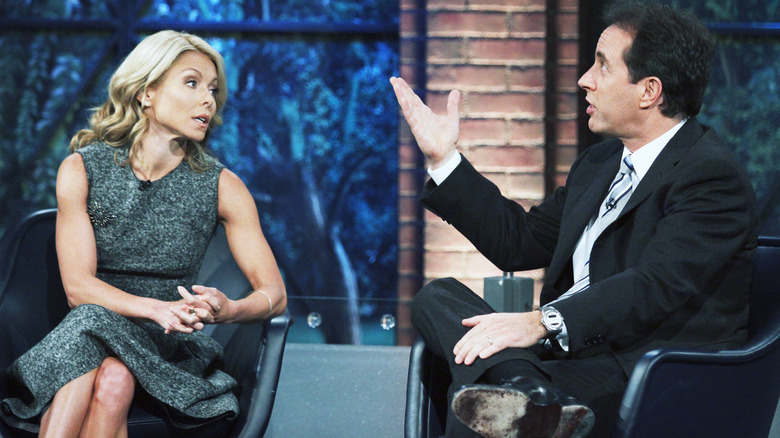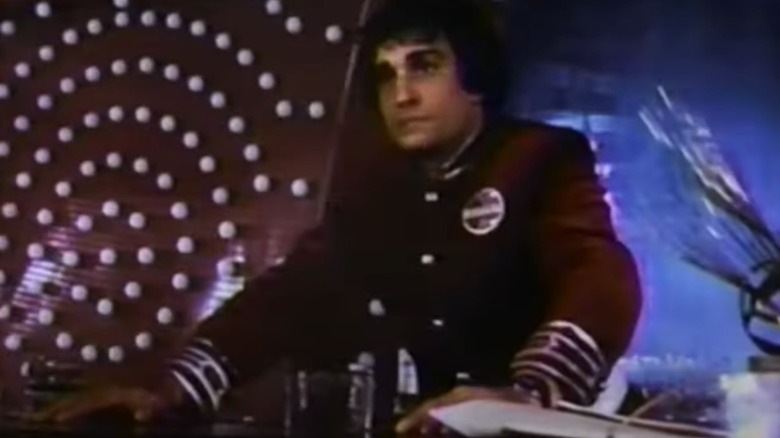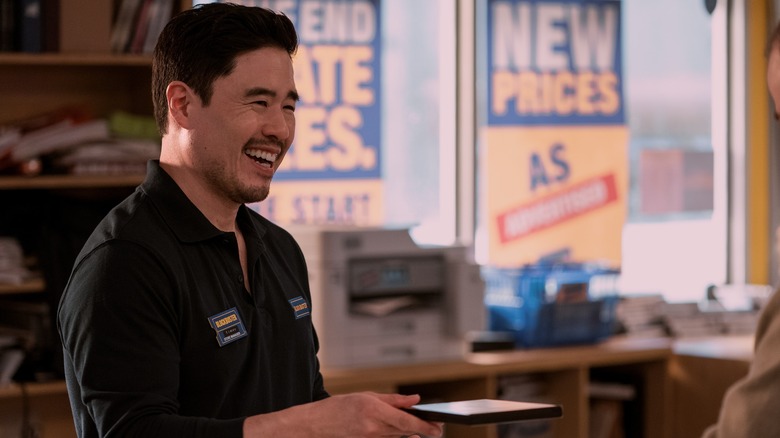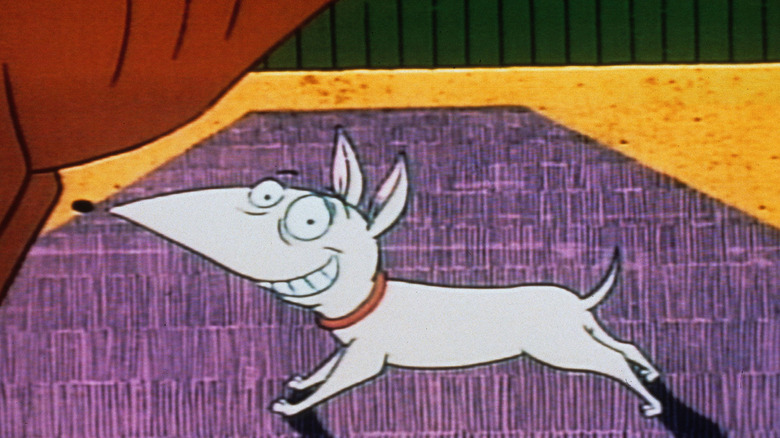Overhyped TV Shows That Ended Up Being Terrible
Plenty of bad shows debut every year. And most of the time, the network or streaming service hosting those shows already seems to know they have a clunker on their hands, and are only putting the show out due to contractual obligations, to fill an empty timeslot, or to try and recoup at least some of the money they spent on it. When this happens, it's evident by the lack of marketing, a dead-end timeslot, or an almost instant cancelation before the show even makes it to five episodes.
However, there are also examples of shows that had a ton of marketing push behind them and still ended up not being very good. It's not always clear how or why this happens — though the most common reason is that the show was created by someone who had one or more huge hits behind them and had earned the trust of a channel/streamer to throw tons of money at a project. While some of the shows on this list are worse than others, what they all have in common is extremely high hopes leading up to their release, followed by both bad reviews and ratings once they actually debuted.
The Idol
When the series that would eventually be released as "The Idol" was first announced in 2021, it felt like a merging of two worlds — music and television — and two of the biggest creative figures in each of those worlds at the time. Starring pop star Abel Tesfaye aka the Weeknd and co-created with Sam Levinson of "Euphoria" fame, there was every reason to be excited about the prospects of the show. It followed Tesfaye as nightclub owner and cult leader Tedros, who is trying to resurrect the career of struggling pop star Jocelyn (Lily-Rose Depp).
In the two years that passed between the announcement of "The Idol" and its 2023 debut on HBO, lots of creative strife went on behind the scenes. Actors and other creative figures came and went, and the show got at least one major retooling. Still, hopes were high that "The Idol" would follow in the footsteps of other acclaimed musician-led shows like "Atlanta" and "Dave." Ultimately, it was not to be. "The Idol" launched to extremely harsh reviews, resulting in a very weak 19% on Rotten Tomatoes and deemed so bad it even threatened to ruin Season 3 of "Euphoria." It was canceled after a single five-episode season, one episode short of the six that were originally planned.
Inhumans
The Marvel Cinematic Universe was still firing on all cylinders in 2017, building up to the epic climax of Phase Three over the following two years. On the small screen, "Agents of S.H.I.E.L.D." was still going strong with its transition between its fourth and fifth seasons. Also in 2017, a third Marvel Television show — the second being the well-received but ratings-challenged "Agent Carter" — entered the fray with a hype boost on a level rivaled by few shows before or since.
In a history-making move, "Inhumans" was revealed to be making its world premiere not on television, but on movie theater screens — IMAX screens, no less. It would mark the first time ever that a live-action TV show debuted this way. Having not just its pilot but its first two episodes premiere on IMAX seemed to speak highly of Disney's faith in the quality and scale of the new show, in which the titular superhero team makes their MCU debut.
Financially, the costly experiment didn't pay off, as the episodes only grossed $3.5 million total from its IMAX gambit. It didn't help that the show itself wasn't very good, scoring only 11% on Rotten Tomatoes — still the lowest score of any MCU product released to date. The series only lasted eight episodes, and the Inhuman Royal Family has never been seen again in the MCU (aside from a Black Bolt cameo in "Doctor Strange in the Multiverse of Madness"). "Inhumans" was largely buried by Marvel Studios and remains one of the biggest flops of the otherwise pretty pristine Marvel franchise.
The Playboy Club
By the 2010s, cable series like "Game of Thrones," "Breaking Bad," "The Walking Dead," and "Mad Men" marked the new standard for so-called prestige television, leaving traditional networks scrambling to catch up. With the rise of cable, NBC lost the crown it had earned from shows like "ER" and "Law & Order." Network brass decided to try and beat cable at its own game, launching what it hoped to be the same kind of attention-grabbing, sexy, edgy awards bait that cable channels had been excelling at.
Hoping to siphon off some of the 1960s-era swagger of "Mad Men" while also attaching it to a legacy albeit risqué IP, "The Playboy Club" debuted in the fall of 2011 and seemed to imply a show that would push the boundaries of what primetime network television typically allowed. On the contrary, critics pointed out that the show did anything but, and most agreed that it would've been better off on cable where it could've had the nudity and naughtiness expected of a show carrying the Playboy name.
The tameness of the show would've probably been a lot more forgivable had it actually been good, but the 21% on Rotten Tomatoes suggests otherwise. Dreadful ratings coupled with backlash and protests over the content led to NBC pulling the plug on "The Playboy Club" after airing only three episodes.
$h*! My Dad Says
These days, internet fame and regular fame are no longer separable. It's becoming increasingly common to spot movie and TV actors you recognized from social media. People also don't bat an eye anymore when something that was previously only an "internet thing" becomes a mainstream product. But in 2010, that sort of thing was still very much a novelty — which made the announcement of a television show based on the popular Twitter account, "S*** My Dad Says," feel like a trailblazing moment.
The fact that the TV version, "$h*! My Dad Says," starred William Shatner as the aging man prone to making inappropriate and off-color statements lent it further perceived legitimacy. A lot was riding on what was seen as new ground for material to base television shows on, and CBS gave it a promising spot in its Thursday night programming block between "The Big Bang Theory" and "CSI." Even sandwiched between two ratings juggernauts, "$h*! My Dad Says" did so poorly that it didn't even get a full first season, pulled the following February after airing only 18 episodes. Perhaps potential audiences were turned off by the dreadful reviews. "$h*! My Dad Says" holds the unfortunate distinction of having a 0% rating on Rotten Tomatoes.
The Chevy Chase Show
After the very messy business with "The Tonight Show" that led to Jay Leno taking over for Johnny Carson and David Letterman starting his own rival show on CBS, a new war for late-night talk show supremacy began in 1993. Fox wanted its own piece of the action and knew it needed a big name to attach to its show to stand any chance at all at gaining a foothold in that space.
Enter "The Chevy Chase Show," which debuted in the fall of 1993. In the lead-up to its premiere, ads took not-so-thinly-veiled shots at the competition, with one in particular poking fun at Letterman's famous gap-toothed smile. Chase might have been a few years past the peak of his star power, but he still hadn't yet hit the mid-to-late-'90s doldrums that saw a series of disappointing films really dull the shine on his career. At the time, one could easily argue that he'd become the biggest name in late night.
Of course, the failure of "The Chevy Chase Show" quickly became the stuff of legend. It lasted just over a month, with a final tally of 29 episodes. The critical consensus was that Chase didn't seem comfortable in the role; the easygoing charisma he was famous for was replaced by awkward, sometimes manic nervousness. It all went so horribly that Fox didn't even attempt another late-night talk show until 2006.
The Million Second Quiz
Just how much hype was there behind NBC's 2013 game show "The Million Second Quiz"? One of its producers told The New York Times, "This is the Olympics of quiz." The AV Club called it "a hyped show about hype." Boasting what was at the time to be the biggest single prize ever awarded in game show history — $2,000,000 — "The Million Second Quiz" was definitely an event. Unfolding in real-time over 1 million seconds (or 11 days, 13 hours, 46 minutes, and 40 seconds), an hour of which aired live each night on NBC, with much more available to watch on NBC's website and app.
It was definitely an ambitious multimedia undertaking. A bit too ambitious, perhaps, because technical glitches plagued the app in the show's first few days. This wasn't an insignificant issue, as viewers playing along on the app were promised a chance to be flown out to New York to join the actual live competition. That didn't do much to keep the audience interested in the show, nor did the overly complicated premise and rules.
Ratings didn't start particularly strong and only fell as the show went on — getting a slight but still disappointing boost for the two-hour finale. Critics were similarly unimpressed. It's unclear whether NBC intended for "The Million Second Quiz" to have a future or if it was always just a one-time event, but those first million seconds are all we ever got.
Viva Laughlin
Though he came up through Australian film and TV and the theater in the 1990s, Hugh Jackman quickly became a movie star after bringing legendary comic book anti-hero Wolverine to the big screen for the first time in 2000's "X-Men." As the decade went on, Jackman fronted a number of big-budget films and continued his stage work — and also hosted three consecutive Tony Awards broadcasts.
Though he eventually merged his screen acting and musical theater talents successfully in hit movies like "Les Misérables" and "The Greatest Showman," that wouldn't happen until the 2010s. Before that, his attempt to show his musical side on television failed spectacularly. In 2007, CBS green-lit a very expensive series adapting the BBC musical serial "Blackpool," changing the title to "Viva Laughlin" and moving the setting from the coast of England to the deserts of Nevada.
That "Viva Laughlin" was canceled after airing only two episodes tells you all you need to know about how well it was received. The New York Times suggested that it not only was the worst new show of that season, but was a contender for worst show of all time. Six additional episodes were produced but never aired — and given that they've yet to surface 15-plus years later, they are considered to be permanently lost.
The Bastard Executioner
Kurt Sutter was instrumental in helping to establish FX as a reliable provider of hit original dramas. First, he was a writer across all seven seasons of "The Shield," which put FX on the map. After that, he created the series "Sons of Anarchy," another big hit for FX that ran for seven seasons.
As "Sons of Anarchy" was winding down, FX obviously had nothing but faith in whatever Sutter did next — and was willing to spend whatever was necessary to get another Sutter-sized hit. Apparently, Sutter next wanted to do an epic historical drama series about an executioner in early 14th-century Wales. The allure of a medieval drama on par with "Game of Thrones" was too much for FX to resist, so the network went ahead and ordered 10 episodes of "The Bastard Executioner," with the per-episode budget nearly doubling that of "Sons of Anarchy." Again, FX was betting big on both the show and on Sutter.
Reviews for "The Bastard Executioner" were soft, with the general consensus being that the show was more concerned with being violent for the sake of violence than actually telling a compelling story. As for ratings, FX and Sutter both mutually decided to cut their losses and not bother with a second season. Instead, Sutter returned to the "Sons of Anarchy" universe with the spin-off "Mayans M.C.," which lasted five seasons.
The Marriage Ref
Once the iconic sitcom "Seinfeld" wrapped in 1998, Jerry Seinfeld didn't seem to be in a rush to do another project and has continually maintained that he doesn't want to reboot the show. It wouldn't be until 2007's "Bee Movie" that Seinfeld put any significant creative weight behind anything else again, erstwhile content to make cameo appearances in other shows and movies. As for television, the world would have to wait 12 years after the series finale of "Seinfeld" before the comedian prominently attached his name to another show.
That show was 2010's "The Marriage Ref," a panel show where celebrities debate the lighthearted marital issues of real-life couples. Seinfeld created and produced the show — and was a panelist in five episodes — though the actual host was comedian Tom Papa. Seinfeld used his considerable clout to get some big names on the show, including a certain future president who at the time was best known for hosting "The Apprentice."
While it seemed like a slam dunk of a premise, critics were not in love with "The Marriage Ref." Reuters summed up the critical consensus as "scathing." Ratings started high enough that NBC ordered a second season. But the network had jumped the gun, as ratings quickly plummeted and never recovered.
Supertrain
Ever heard of a TV show failing so badly that it nearly took an entire network down with it? That's what happened with 1979's "Supertrain," one of the most expensive flops in TV history. "The Love Boat" was a huge hit for ABC at the time, and NBC wanted some of that action. So it took the basic premise of "The Love Boat" and moved it to a futuristic train that otherwise had all the same amenities as a cruise ship.
NBC spared no expense in bringing "Supertrain" to life. The pilot alone cost the network roughly $28.6 million when adjusted for inflation, easily earning its title as the most expensive TV series ever made up to that point. With that kind of cash being ponied up, the show had to be a massive critical and commercial smash right off the bat — and it was neither. Critics were impressed by the sets but little else, and ratings were so poor that NBC tried to retool the show several episodes in while also cutting the main cast in half in an effort to help the audience click more with the characters.
None of it worked, and the failure of "Supertrain" was so expensive that NBC almost went bankrupt as a result. All for a show that most people don't even remember.
Blockbuster
When the video rental chain Blockbuster Video filed for bankruptcy in 2010, the world felt wistful but largely indifferent. After all, everyone loved Netflix's cheaper, more flexible, and late fee-free DVDs-by-mail service. But as these things go, the generation that grew up renting movies and games from Blockbuster started to get really nostalgic about it as time went on, longing for the days of perusing its many aisles.
Further fanning the flames of this retrospective love is that public opinion on Netflix and the other streaming services had begun to sour going into the 2020s — price hikes, content purges, and simply too many options had people longing for simpler times. All this came together to set the stage for a workplace comedy set in a Blockbuster store, seemingly the perfect place to set a comedy and at the exact right time to do so. The cast was impressive, too, with sitcom stars Randall Park and Melissa Fumero hopping aboard from "Fresh Off the Boat" and "Brooklyn Nine-Nine," respectively. But perfect timing, a nostalgic premise, and a strong cast don't mean a thing if the show itself is nothing special, and "Blockbuster" ended up with an unremarkable 23% on Rotten Tomatoes.
Netflix, which ironically produced and distributed the show, infamously doesn't waste any time axing a show that isn't living up to the streamer's ratings standards, and it announced that "Blockbuster" wouldn't get a second season just a month after launching the first. The news prompted The AV Club to say exactly what everyone was thinking: "Netflix killed Blockbuster again."
Family Dog
After the massive success of "The Simpsons," many primetime animated shows tried to compete. In terms of network television, it wouldn't be until "King of the Hill" that any of them stuck around for more than a season or two. So many came and went that the 1992 Halloween episode of "The Simpsons" opened up with a graveyard featuring the names of various canceled animated shows on the tombstones.
Among those names was a single-season sitcom "Family Dog." After being one of the breakout episodes of anthology series "Amazing Stories," the animated short created by Brad Bird — who would become a "Simpsons" writer shortly after — was eventually commissioned as a half-hour series by CBS. Despite having such a strong foundation to build on and both Steven Spielberg and Tim Burton as executive producers, the series version of "Family Dog" fell flat.
Reviews were harsh, and like so many of its ilk, "Family Dog" was moved to a farm upstate before it even got a full season. As for Bird, he continued working on "The Simpsons" for several years and eventually wrote and directed several of the best animated movies of all time — including "The Iron Giant," "Ratatouille," and "The Incredibles."
